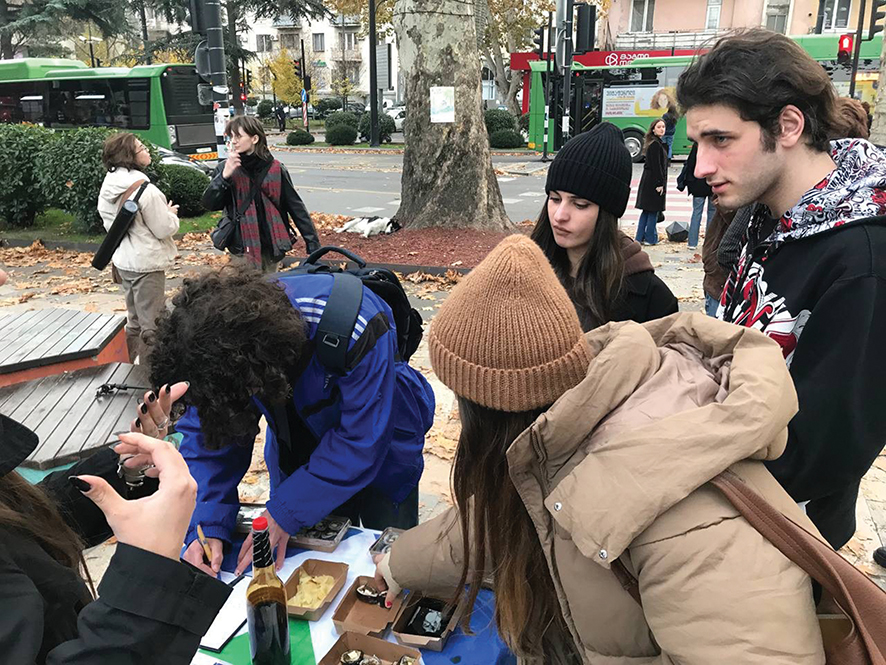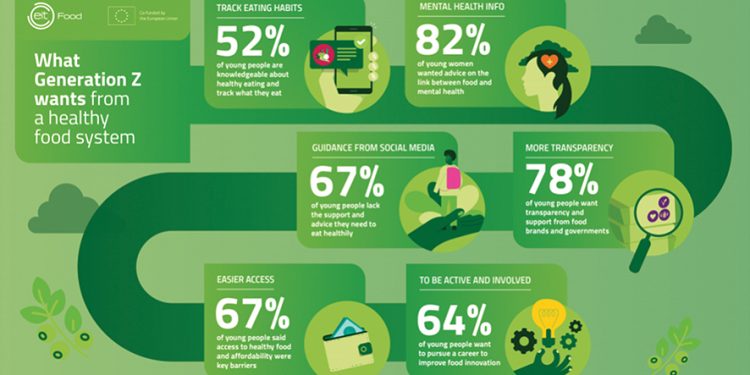With over 235 million students enrolled in higher education worldwide, and tens of millions of faculty and staff working at these institutions, universities and colleges are key food providers.
In 2018, the world’s biggest food production analysis, conducted at the University of Oxford, concluded that rejecting resource-intensive and pollutive animal agriculture, and adopting a plant-based diet, was the best way a person could reduce their carbon footprint. Gen Z (born between 1997 and 2012), which makes up around 25% of the planet’s population, and which is the biggest demographic group right now, is known to be the most enthusiastic about plant-based foods. A University of Massachusetts dining survey found that students are asking for more plant-based menu items, including burgers, sausages and pizzas, while plant-based breakfast options were found to be popular among both the vegan and omnivore student diners.
Among the suggested solutions for universities seeking to reduce their students’ carbon footprint are:
• Replacing the meat options on the menu with plant based ones – simple ingredient swaps that will not affect quality, taste, or cost;
• Introducing new plant based options on the menu;
• Organizing an alternative catering service for those students who prefer plant based dishes, through collaboration with vegan venues/producers and delivery companies;
• Encouraging other institutions to follow the changes by providing media and social media support to the campaign.
Good examples of the global push towards plant based menus in universities include the 2011 announcement by the University of North Texas that it was opening the first all-vegan dining hall in history, embracing not only the students of UNT but many other residents of the area; in 2021, the authorities of Berlin launched a program to reduce carbon footprints by implementing plant based foods in its university canteens with 68% vegan, 28% vegetarian and only 4% of meat and fish dishes; the Plant Based University campaign, launched in the UK in 2021, announced its goal to move towards 100% plant based menu in cafeterias by 2025; in 2022, all public schools in New York launched Vegan Fridays, which means that every Friday 930,000 students are served plant based meals, and the same year, the government of California invested $700 million in plant based school meals. Further, on January 23 this year, Odd Burger, Canada’s first 100% vegan fast food joint, opened at Western University – the first of its kind on a Canadian campus.
Last year, Vegan Georgia started its own university menu veganization campaign, called “Future Food”. Its main goal is to veganize the menus in all university canteens of Georgia, then those of kindergartens and other institutions. So far, they have given presentations in a number of Tbilisi universities, run food giveaways, and sought to spread information about veganism and its importance.
To find out more, GEORGIA TODAY spoke to Nini Turashvili, President of Vegan Georgia, and her colleague, Oleg.
“On December 5 and 7, we held two events in front of Tbilisi State University and Ilia State University,” Nini tells us. “Our primary goal was to collect signatures to give to the rectors of the universities, to push for the addition of more plant based options on the canteen menus. Besides collecting signatures, we handed out flyers in Geo/Eng about the Future Food campaign, its advantages, and the importance of plant based food. We also gave out free vegan sushi for students to get perhaps their first taste of delicious cruelty-free alternatives.”

Why do you see it as important to veganize university menus?
“Being vegan is a moral-ethical minimum, which is the only way to liberate animals and stop the climate crisis,” Nini says. “Eating plant based food is a great chance to take care of our health and the planet in parallel. Veganizing menus in universities means raising awareness about the need for veganism and helping animals and the planet. In other developed countries, there are rapidly rising statistics on the veganization of different institutions, which ultimately leads to the future we want to achieve.”
“We came up with this campaign following the worldwide trend and being inspired by the amazing results of our foreign comrades who were extremely kind to share their experience and materials on the topic,” Oleg adds.

What has the Future Food campaign achieved so far?
“We launched this campaign at the end of spring, too close to the end of the semester, and then couldn’t get back to it until October, when the classes in the universities started up again, so we haven’t had much time for active events yet,” Oleg says, “but we are already collaborating closely with the Medical Academy, whose eco-club does incredible work supporting the campaign. We also found a fantastic vegan chef for the campaign, who is elaborating some awesome plant based meals for the university menus. We had those food giveaways Nini mentioned, and we also conducted a survey among the students of the Medical Academy and were absolutely stunned by the results: 60% of the respondents would like to try new plant based options, and more than 40% would visit the university canteen more often if there were more plant based options on the menu. In other words, we are very excited with the campaign and its foreseeable outcomes!”
“Menu veganization should happen in every institution,” Nini says, “But starting the process in the universities is an efficient start. In future, we plan to cover not only universities, but also schools, kindergartens and more.”

What challenges are there in Georgia for such veganization?
“The main challenge is the social-cultural background in Georgia,” Nini tells us. “Some people don’t have enough information about veganism or its meaning connected to animal freedom, climate crisis and health. Also, the food alternatives we are trying to suggest need to be more affordable. Unfortunately, in Georgia, unlike in other European countries, imported vegan food alternatives are higher in price than non-vegan. Luckily, though, we have tons of other delicious vegan food in Georgia, which is affordable and healthy, and so we are focusing on these alternatives.”
“It’s not that easy to approach universities, especially in terms of their canteens, if you don’t have strong support from at least one student attending that university, because the changes we are suggesting cannot be brought in from the outside — there should be an internal initiative, which Vegan Georgia then assists with,” Oleg says. “So, we highly encourage all the students who are reading this, and who would like have this campaign launched in their university, to contact us. It won’t be a complicated or challenging task to help us start the campaign, but without your support we won’t be able to put it together to kick it off!
“It is important to do, because we see the students as our priority audience, the hope and the future,” he concludes.
What support does Vegan Georgia offer universities wanting to take part in the Future Food campaign?
“The Vegan Georgia Future Food campaign involves supporting students’ initiatives to include plant based dishes on the menus of their universities; providing all guides and theoretical materials that can be helpful to implement these changes; providing the help of a professional chef who will be happy to make culinary workshops and presentations for the cooks of the local canteens; organizing events connected with the launch of the plant based options on the menus of the universities; and providing media and social media support for the events and other news concerning the positive changes to the menus,” Nini outlines.
“Our chefs can offer a lot of healthy, filling and environmentally friendly plant based dishes for the canteen or buffet menu, even for vending machines,” she adds. “Some of our suggestions are Seitan Burgers served with mashed potato and green salad; Tofu Sandwich; Tofu Casserole; Soya and Mushroom Dumplings; Falafel served with rice and aubergine salad; lentil, carrot, chickpea, tomato, pumpkin and other vegetable soups; and pastries such as apple pie, pancakes with cherry jam, and buns with lemon stuffing.”
So, why go plant based?
It’s eco-friendly, it’s healthy, it’s tasty! Animal agriculture and the production of animal products bring great damage to the planet, causing air, water and land pollution. Besides, nowadays, most nutritionists agree that at least decreasing of consumption of animal products is recommended, as it leads to fewer diseases and disorders. What’s more, it’s kind- the compassionate treatment of animals is a world trend of the 21st century, and is among the reasons for plant based meals’ growing popularity being reflected in legislation, economic and social changes.
ABOUT VEGAN GEORGIA
Vegan Georgia was founded in 2015 as the first and so far the only NGO in Georgia aimed at protecting farm animals and other representatives of the animal kingdom, regardless of species. They see their main goals in: Educating others on plant based nutrition and fundamental animal rights, confronting unethical industries, enterprises and practices, legislative work and legal support for animal protection and initiatives, and supporting plant based venues, initiatives and events.
***
The UN FAO estimate that 10 million hectares of forest are cut down each year.
Livestock takes up nearly 80% of global agricultural land, yet produces less than 20% of the world’s supply of calories.
Today, animal agriculture:
• uses ~83% of the world’s farmland;
• provides only 37% of our protein and 18% of our calories;
• contributes 56 to 58% of food’s different emissions;
• livestock emissions from manure and gastroenteric releases account for roughly 32% of human-caused methane emissions;
• is a chief driver of deforestation and the loss of biodiversity (-69% since 1970);
• is a major cause of pandemics, including SARS, Swine Flu, and the Spanish Flu;
• is responsible for the abuse and slaughter of 88 billion farm animals per year.
For more information or to sign on to the Vegan Georgia campaigns, contact Nini Turiashvili at nini.turiashvili@vegangeorgia.org and check out vegangeorgia.org.
By Katie Ruth Davies














